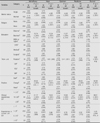Abstract
Purpose
The purpose of this study was to analyze factors affecting burnout among clinical nurses according to Positive Psychological Capital.
Methods
The study design was a descriptive survey and questionnaires were collected from 412 clinical nurses who worked in a general hospital in "J" city. Data were analyzed using frequency, percentage, mean, standard deviation, independent t-test, One-way ANOVA, Scheffé test, Pearson Correlation, and hierarchical multiple regression.
Results
In Model individual characteristics accounted for 27.8% of the influence on burnout. In model II with the addition of the 4 factors; Self-efficacy, Hope, Resilience, Optimism, individual characteristics accounted for 48.5% of the influence on burnout. Optimism and Resilience of the Positive Psychological Capital sub-variables were statistically useful as factors influencing burnout.
Figures and Tables
References
1. Bakker AB, Le Blanc PM, Schaufeli WB. Burnout contagion among intensive care nurses. J Adv Nurs. 2005. 51:276–287.
2. Baik DW, Yom YH. Effects of social support and emotional intelligence in the relationship between emotional labor and burnout among clinical nurses. J Korean Acad Nurs Adm. 2012. 18:271–280.
3. Byun DS, Yom YH. Factor affecting the burnout of clinical nurses: Focused on emotional labor. J Korean Acad Nurs Adm. 2009. 15:445–454.
4. Choi JS, Park SM. Comparison of job stress, hardness, and burnout of nurses between advanced general hospitals and general hospitals. J Korea Contents Assoc. 2012. 12:251–259. http://dx.doi.org/10.5392/JKCA.2012.12.03.251.
5. Choi HY, Chung NW. Perfectionism tendency, social support, and burnout among counselors. Korean J Health Psychol. 2003. 8:279–300.
6. Gorkin M. The four stages of burnout. J Addit Inf. 2004. 83(4):24–34.
7. Kim J, Ahn HY, Eom MR, Lee MY. A study of emergency room nurse's burnout nursing performance and professional identity. Korean J Occup Health Nurs. 2010. 19:50–59.
8. Kim YO. A Relationship of hardiness, job stress, and burnout in hospital staff nurses. J Korean Acad Adult Nurs. 2002. 14:591–601.
9. June KJ, Byun SW. Nurse's burnout research throughout the past 10 years in Korea. J Korean Acad Nurs Adm. 2009. 15:305–313.
10. Lee DS, Choi YD. A study on the antecedents and consequences of positive psychological capital in organizations. J Bus Res. 2010. 39:1–28.
11. Lee NH. A study on the relationship among self-efficacy of psychiatric nurses, job stress and burnout. Nurs Sci. 2011. 23(2):53–59.
12. Lee KJ, Lee E. The relationship of emotional labor, empowerment, job burnout and turnover intention of clinical nurses. Korean J Occup Health Nurs. 2011. 20:130–142.
13. Lee MY, Kim KH. Influence of head nurses transformational leadership on staff nurse's psychological well-being, stress and somatization: Focused on the mediating effect of positive psychological capital. J Korean Acad Nurs Adm. 2012. 18:166–175.
14. Luthans F. The need for and meaning of positive organizational behavior. J Organ Behav. 2002. 23:695–706.
15. Luthans F, Avey JB, Avolio BJ, Norman SM, Combs GM. Psychological capital development: Toward a macro-intervention. J Organ Behav. 2006. 27:387–393.
16. Luthans F, Avolio BJ, Avey JB, Norman SM. Psychological capital: Measurement and relationship with performance and job satisfaction. Pers Psychol. 2007. 60:541–572.
17. Luthans F, Avolio B, Walumbwa F, Li W. The psychological capital of Chinese workers: Exploring the relationship with performance. Manage Organ Rev. 2005. 1:247–269.
18. Luthans F, Youssef CM. Emerging positive organizational behavior. J Manage. 2007. 33:321–349.
19. Luthans F, Youssef CM, Avolio BJ. Psychological capital developing the human competitive edge. 2007. Oxford, UK: Oxford University Press.
20. Lymbomirsky S, King L, Diener E. The benefits of frequent positive affect: Does happiness lead to success. Psychol Bull. 2005. 131:803–855.
21. Maslach C, Jackson SE. MBI-Human services survey. 1981. Mountain View: Consulting Psychologist Press.
22. O'Mahony N. Nurse burnout and the working environment. Emerg Nurse. 2011. 19(5):30–37.
23. Park HS, Kim KN. Factors affecting burnout in ICU nurse. J Korean Acad Fundam Nurs. 2010. 17:409–418.
24. Ryu HJ. The relationship among positive psychological capital, job characteristics and organizational characteristics of large corporation employees. 2012. Seoul, Korea: Seoul National University;Unpublished master's thesis.
25. Seligman MEP. Positive psychology, positive prevention, and positive therapy. 2002. New York, NY: Wiley.
26. Sherwin ED, Elliott TR. Negotiating the reality of caregiving: Hope, burnout and nursing. J Soc Clin Psychol. 1992. 11:129–139.
27. Song JY. The moderating effect of hope between novice counselor's job stress and burnout. 2012. Seoul, Korea: The Catholic University of Korea;Unpublished master's thesis.
28. Stajkovic AD, Luthans F, Slocum JW Jr. Social cognitive theory and self-efficacy: Going beyond tradition motivational and behavioral approaches. Organ Dyn. 1998. 26(4):62–74.
29. Yang YK. A study on burnout, emotional labor, and self-efficacy in nurses. J Korean Acad Nurs Adm. 2011. 17:423–431.
30. Yoon J, Chung J. Relationships among optimism, cognitive emotion regulation, and counselor burnout. Korean J Couns Psychother. 2009. 21:49–68.




 PDF
PDF ePub
ePub Citation
Citation Print
Print







 XML Download
XML Download